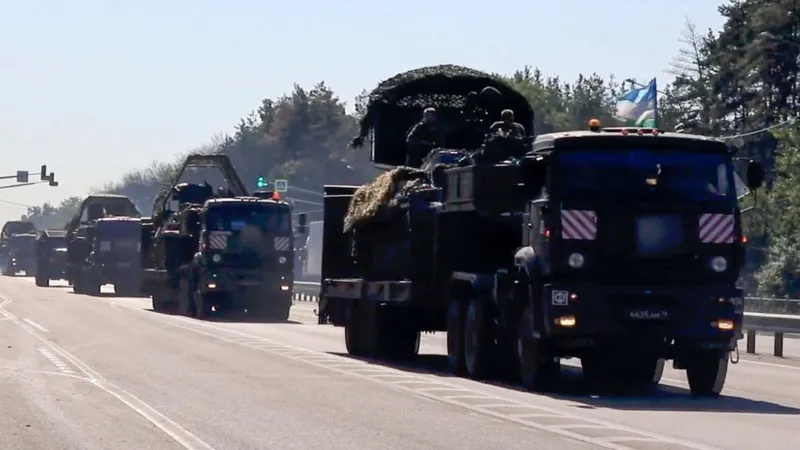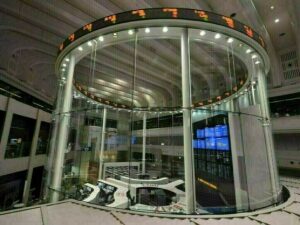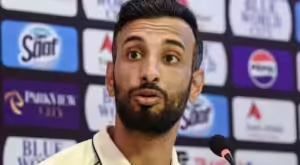Zelensky confirms Ukrainian troops fighting inside Russia

Ukrainian President Volodymyr Zelensky has acknowledged for the first time that his military is conducting a cross-border offensive inside Russia’s western Kursk region.
In his video address late on Saturday, Mr Zelensky said Ukraine’s military was pushing the war onto “the aggressor’s territory”.
Kyiv launched its surprise attack on Tuesday, rapidly advancing more than 10km (six miles) inside Russia – the deepest raid since Moscow began its full-scale invasion of Ukraine in February 2022.
In Ukraine, the capital Kyiv and several other regions came under a Russian drone and missile attack in the early hours of Sunday, local officials said.
In his address, President Zelensky thanked Ukraine’s “warriors”, and said he had discussed the operation in Russia with the country’s top military commander Oleksandr Syrskyi.
“Ukraine is proving that it can indeed restore justice and ensure the necessary pressure on the aggressor,” he added.
Russia has so far struggled to halt the Ukrainian advance, with more than 76,000 people evacuated from the Kursk region and a “counter-terror” regime imposed across three border areas.
This means authorities in Kursk, Belgorod and Bryansk regions can restrict the movement of people and vehicles and use phone tapping among other measures.
The fighting appeared to be ongoing on Saturday night, with Kursk Governor Aleksei Smirnov saying early on Sunday that there were injured people in a “treacherous” Ukrainian attack.
He earlier reported that 13 people were injured late on Saturday when the wreckage of a downed Ukrainian missile fell on a multi-storey building in the regional capital Kursk.
The governors of Russia’s neighbouring Voronezh and Belgorod regions also reported a Ukrainian drone attack overnight. They did not mention any injuries.
In Ukraine, a 35-year-old man and his four-year-old son were killed in the Kyiv region when a rocket fragment fell on residential houses, emergency services said on Sunday.
Three more were wounded, including a 13-year-old child.
Kyiv Mayor Vitaliy Klitschko posted on Telegram early on Sunday morning that air defence units were “operating” and warned civilians to stay in shelters.
Ukraine’s rare incursion into Russia began on Tuesday morning, when up to 1,000 troops, supported by tanks and armoured vehicles, entered the Kursk region, Russia said.
The Ukrainians have since reportedly seized a number of villages, and are also threatening the regional town of Sudzha.
On Friday, a video emerged showing armed Ukrainian soldiers who claimed to have control over the town, as well as a key Russian gas facility there owned by the Gazprom company.
BBC Verify has confirmed that the footage was indeed from the Gazprom facility on the north-western outskirts of Sudzha, about 7km from the border with Ukraine. The video alone does not verify the claim that Ukrainian troops have taken the whole town.
Russian military bloggers earlier claimed that the town was still in Moscow’s hands.
BBC Verify confirmed the location of another video posted online on Friday morning. It shows a 15-vehicle Russian convoy damaged, burned and abandoned on a road through the town of Oktyabrskoe, roughly 38km from the border on the Russian side.
The footage also shows Russian soldiers – some injured, some possibly dead – among the vehicles.
Moscow has since sent reinforcements – including tanks and rocket-launcher systems – to the Kursk region, saying that Russian troops were “continuing to repel the attempted invasion” of Ukrainian forces.
The Russian claim has not been independently verified.
On Friday, the UN nuclear agency urged both Russia and Ukraine to “exercise maximum restraint” as the fighting was edging closer to the Kursk nuclear power plant – one of the biggest such facilities in Russia.
International Atomic Energy Agency (IAEA) chief Rafael Grossi said measures must be taken “to avoid a nuclear accident with the potential for serious radiological consequences”.
The power plant is located about 60km north-east of Sudzha.




